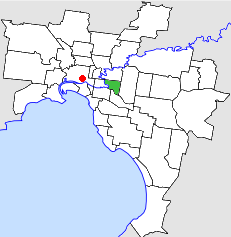Local government area in Victoria, Australia
| City of Hawthorn Victoria | |||||||||||||||
|---|---|---|---|---|---|---|---|---|---|---|---|---|---|---|---|
 Location in Melbourne Location in Melbourne | |||||||||||||||
 Hawthorn Town Hall Hawthorn Town Hall | |||||||||||||||
| Population | 31,500 (1992) | ||||||||||||||
| • Density | 3,244/km (8,402/sq mi) | ||||||||||||||
| Established | 1860 | ||||||||||||||
| Area | 9.71 km (3.7 sq mi) | ||||||||||||||
| Council seat | Hawthorn | ||||||||||||||
| Region | Eastern Melbourne | ||||||||||||||
| County | Bourke | ||||||||||||||
 | |||||||||||||||
| |||||||||||||||
The City of Hawthorn was a local government area about 4 kilometres (2.5 mi) east of Melbourne, the state capital of Victoria, Australia, on the southeast bank of the Yarra River. The city covered an area of 9.71 square kilometres (3.75 sq mi), and existed from 1860 until 1994.
History
Hawthorn was incorporated as a municipal district on 27 July 1860. It was proclaimed as a town on 18 March 1887, and a city on 12 September 1890.
On 22 June 1994, the City of Hawthorn was abolished, and along with the Cities of Camberwell and Kew, was merged into the newly created City of Boroondara. The new City was originally planned to be named "City of Riversdale".
The council met at the Hawthorn Town Hall, at the corner of Burwood and Glenferrie Roads, near Glenferrie railway station, Hawthorn. The facility is still used by the City of Boroondara as a regional arts centre.
Wards
The City of Hawthorn was divided into four wards in 1891, each electing three councillors:
- Auburn Ward
- Glenferrie Ward
- Power Ward
- Yarra Ward
Geography
The council area covered the suburbs of Hawthorn, Hawthorn East and parts of Glen Iris, and was bounded by the Yarra River to the west, Barkers Road to the north, Gardiners Creek and CityLink (formerly South Eastern Freeway) to the south and Burke Road to the east.
Population
| Year | Population |
|---|---|
| 1861 | 2,342 |
| 1881 | 6,019 |
| 1891 | 19,585 |
| 1947 | 40,464 |
| 1954 | 37,188 |
| 1958 | 35,700* |
| 1961 | 36,707 |
| 1966 | 36,717 |
| 1971 | 37,571 |
| 1976 | 32,505 |
| 1981 | 30,689 |
| 1986 | 29,623 |
| 1991 | 30,006 |
* Estimate in the 1958 Victorian Year Book.
See also
References
- Australian Bureau of Statistics, Victoria Office (1994). "Victorian Year Book". Victorian Year-Book: 49. ISSN 0067-1223.
- Victorian Municipal Directory. Brunswick: Arnall & Jackson. 1992. pp. 393–394. Accessed at State Library of Victoria, La Trobe Reading Room.
- Australian Bureau of Statistics (1 August 1995). Victorian local government amalgamations 1994-1995: Changes to the Australian Standard Geographical Classification (PDF). Commonwealth of Australia. p. 4. ISBN 0-642-23117-6. Retrieved 16 December 2007.
- "Municipal shake-up". The Age. 9 April 1994. Retrieved 23 April 2023.
- "Mayor introduces Hawthorn's new leading lady of the arts". City of Boroondara. Archived from the original on 2 April 2016. Retrieved 18 March 2014.
- "Timeline | Hawthorn Historical Society".
- "Melway - Greater Melbourne Street Directory". Melway Greater Melbourne Street Directory: Including Geelong, Phillip Island, Healesville, Bellarine & Mornington Peninsulas (22nd ed.). Glen Iris, Victoria: Melway Publishing Pty Ltd: Maps 44–45, 58–59. 1993. ISSN 0311-3957.
External links
37°49′18″S 145°02′12″E / 37.8216°S 145.0367°E / -37.8216; 145.0367
Categories: